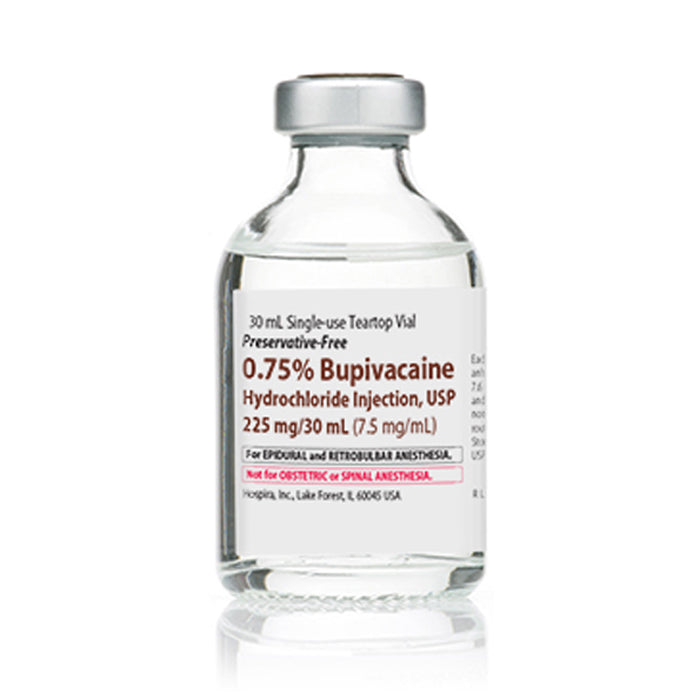Bupivacaine 0.75% for Injection Single-Dose Vials 30 mL, 25/Tray (Rx)
(Note: We don’t Fill Personal Prescriptions)
How to Order:
Bupivacaine 0.75% for Injection is a local anesthetic used to provide prolonged pain relief by blocking nerve signals during surgical, dental, or obstetric procedures, including labor and delivery. It works by numbing a specific area to inhibit sensation and reduce discomfort. Bupivacaine is particularly effective for regional anesthesia techniques like epidurals and nerve blocks, offering sustained pain management for complex procedures and postoperative recovery.
Bupivacaine 0.75% for Injection is a local anesthetic used primarily for regional anesthesia, including epidural and peripheral nerve block techniques. Offered by Pfizer Injectables, these vials are designed for single-dose use in medical settings to provide long-lasting pain relief during surgery or obstetric procedures.
Details and Features
Active Ingredient: Bupivacaine Hydrochloride
Concentration: 0.75% (7.5 mg/mL)
Volume: 30 mL per vial
Format: Single-dose vial
Packaging: 25 vials per tray
Indications: Suitable for surgical anesthesia, obstetrical procedures, and other interventions requiring prolonged local or regional anesthetic effect.
Manufacturer: Pfizer Injectables
Mechanism of Action
Bupivacaine works by blocking sodium channels on neuronal membranes, specifically inhibiting the initiation and transmission of nerve impulses. This action results in a reversible loss of sensation, providing effective local or regional anesthesia. Compared to other local anesthetics, bupivacaine has a longer duration of action, making it suitable for procedures requiring extended anesthesia.
Warnings
-
Cardiovascular Risks: There is a significant risk of cardiotoxicity, especially if inadvertently injected intravascularly. This includes the potential for arrhythmias or cardiac arrest.
-
Central Nervous System Effects: Potential for CNS toxicity, which may present as tinnitus, seizures, or respiratory depression.
-
Allergic Reactions: Though rare, patients may exhibit hypersensitivity to amide-type anesthetics.
-
Use in Pregnant Women: Caution is advised, particularly when used for epidural anesthesia, as it can affect maternal blood pressure and fetal wellbeing.
- Contraindications: Not suitable for intravenous regional anesthesia (Bier block) or in patients with any history of hypersensitivity to bupivacaine or similar drugs.
Side Effects
Common Side Effects:
- Prolonged numbness or tingling in the area of injection
- Hypotension
- Nausea
- Dizziness or lightheadedness
Serious Side Effects:
-
Cardiovascular events: Bradycardia, hypotension, cardiac arrest
-
Central nervous system toxicity: Seizures, confusion, persistent drowsiness
-
Allergic reactions: Anaphylaxis, rash, or hives
- Respiratory depression or difficulty breathing
Administration and Monitoring
Administration should be conducted by trained healthcare professionals familiar with anesthesia techniques and the management of potential toxicities. It is essential to monitor cardiovascular and respiratory function throughout the use of bupivacaine, especially when used in high doses or in sensitive populations. Facilities for resuscitation should be readily available when using this medication. Adjustments in dosage and careful monitoring are crucial to mitigate adverse effects, especially in patients with existing cardiac conditions or those receiving other CNS depressants.

